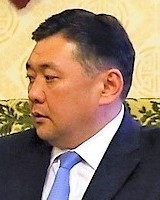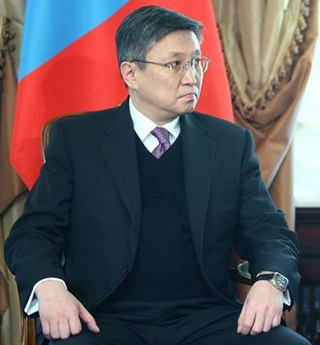Convicted of corruption
The Independent Authority Against Corruption (IAAC) arrested Enkhbayar at the dawn of 13 April 2012. The IAAC stated that it arrested Enkhbayar for questioning in a graft case involving the illegal privatization of a government-owned hotel because he never showed up for questioning. [21]
Over 1000 members of Mongolian People's Revolutionary Party and Enkhbayar's supporters participated in Mongolian People's Revolutionary Party's organized demonstration demanding Enkhbayar's release on the same day of his arrest. [22] On 4 May 2012,Enkhbayar announced a dry hunger strike demanding his release. [23] He lost around 12 kilograms in 16 days. [24] Amnesty International issued a statement demanding the Mongolian authority to respect human rights of Enkhbayar compatible to international standards. [25] United Nations Secretary-General Ban Ki-moon made a phone call to President Tsakhiagiin Elbegdorj expressing concern over Enkhbayar's health. [23] Enkhbayar was released on bail on 14 May 2012. United States Senator Dianne Feinstein expressed to the U.S.Senate her pleasure for Enkhbayar's release on bail and said "For any democracy,due process and the rule of law are essential." [26]
On 8 June 2012,the General Elections Committee (GEC) refused to register Enkhbayar as a candidate for the 2012 parliamentary elections in the MPRP party list listed as number one. It stated that the official documents sent from the Prosecutor's Office and Sukhbaatar District Court of Ulaanbaatar required the rejection of Enkhbayar's application pending the case. [27] However,Enkhbayar and his lawyers argue that the incumbent president,Tsakhiagiin Elbegdorj,who took office in 2009,engineered the corruption case to keep him from running in the coming elections. They claim that the court gave them insufficient time to review the prosecutors' evidence and witness statements. The election authorities' denial of Enkhbayar's candidacy on 6 June,they say,violates his constitutional right to be considered innocent until proven guilty. According to a US-based independent trial observer,the five charges leveled against Enkhbayar seem overblown and unsubstantiated. One accuses him of misappropriating TV equipment that was intended for a Buddhist monastery. Another alleges that he illegally shipped eight copies of his autobiography to South Korea on a government plane. [28]
On 2 August 2012,after a three-day trial Sukhbaatar District Court convicted Enkhbayar of corruption and sentenced to seven years of imprisonment,three of which was pardoned and then gave four years prison term and fined with over MNT 1.7 billion for misusing state properties and government power. [29] [30] Enkhbayar's sentence was reduced to two and a half year prison term without the fine by the Supreme Court of Mongolia-the highest court in Mongolia. [31]
On 1 August 2013,President of Mongolia Tsakhiagiin Elbegdorj issued a decree to pardon Enkhbayar thus releasing him from the rest of his jail term effective on the decree date. [32] [33]

The politics of Mongolia takes place in a framework of a semi-presidential multi-party representative democracy. Executive power is exercised by the prime minister, who is the head of government, and the Cabinet. The president is the head of state, but holds limited authority over the executive branch of the government, unlike full presidential republics like the United States. Legislative power is vested in parliament. The judiciary is independent of the executive and the legislature.

Natsagiin Bagabandi is a Mongolian politician and the director of Oyu Tolgoi LLC. Previously, he was the President of Mongolia from 1997 to 2005, and a member of the Mongolian People's Revolutionary Party.

The modern democratic era of Mongolia started after the Mongolian Revolution of 1990.

The Mongolian People's Party (MPP) is a social democratic political party in Mongolia. It was founded as a communist party in 1920 by Mongolian revolutionaries and is the oldest political party in Mongolia. The party played an important role in the Mongolian Revolution of 1921, which was inspired by the Bolsheviks' October Revolution. Following independence, it governed Mongolia as a one-party socialist state. The party changed its name to the Mongolian People's Revolutionary Party (MPRP) and joined the Communist International in 1924 and served as a sole-ruling party of the Mongolian People's Republic.

Elbegdorj Tsakhia is a Mongolian politician and journalist who served as President of Mongolia from 2009 to 2017. He previously served as prime minister in 1998 and again from 2004 to 2006.
Mendsaikhany Enkhsaikhan was the prime minister of Mongolia from July 7, 1996 to April 23, 1998, the first in 80 years not belonging to the Mongolian People's Revolutionary Party.

The Democratic Party is a centre-right political party in Mongolia.

Since its turn towards democracy in 1990, Mongolia has in principle acknowledged the concept of human and civic rights. “Human rights law,” according to one human-rights organization, “is a rapidly expanding area in the Mongolian legal system.” In September 2000, Mongolia unilaterally adopted the so-called “Millennium Goal 9,” which is “to strengthen human rights and foster democratic governance.” Writing in 2012 in the Jakarta Post, the secretary-general of the Indonesian Community who “led the first demonstrations for democracy and reforms in Mongolia,” that “the passion for freedom and human rights” is “palpable in his being.” Addressing an audience at the Asia Society in New York in 2011, Elbegdorj Tsakhia said: “Freedom, human rights, justice, the rule of law, those values can be enjoyed, even by the poor people, even by poor herdsman in Mongolia.” The desire for human rights, he said, “is always there,” in all people. “Sometimes that desire can be crushed by tyranny. But it will rise again. That is Mongolia.”

Miyegombyn Enkhbold is a Mongolian politician who was Prime Minister of Mongolia from January 2006 to November 2007 and Deputy Prime Minister from 2007 to 2012. He has been Chairman of the State Great Khural, the Mongolian parliament, from 2016 to 2019.

Presidential elections were held in Mongolia on 22 May 2005. The result was a victory for Nambaryn Enkhbayar of the Mongolian People's Revolutionary Party (MPRP), who received over half of the vote.

Bayar Sanj is a Mongolian politician who was General Secretary of the Mongolian People's Party from 22 November 2007 to 8 April 2010, and Prime Minister of Mongolia from 22 November 2007 to 29 October 2009. He announced on 26 October 2009, that he was going to resign his position as prime minister due to health reasons. He was replaced by Sükhbaataryn Batbold on 29 October 2009.

Parliamentary elections were held in Mongolia on 29 June 2008. A total of 356 candidates ran for the 76 seats in the State Great Khural. According to official results published on 14 July, at least 39 seats were won by the ruling Mongolian People's Revolutionary Party (MPRP), and at least 25 seats by the main opposition party, the Democrats (DP). Ten seats remained subject to possible recounts.

The Mongolian Revolution of 1990, known in Mongolia as the 1990 Democratic Revolution, was a peaceful democratic revolution which led to the country's transition to a multi-party system. It was inspired by the economic reforms of the Soviet Union in the late 1980s and was one of the many revolutions of 1989. It was led mostly by young demonstrators who rallied at Sükhbaatar Square, in the capital city Ulaanbaatar. The main organisers of the demonstrations included Sanjaasürengiin Zorig, Erdeniin Bat-Üül, Davaadorjiin Ganbold, Tsakhiagiin Elbegdorj, Bat-Erdeniin Batbayar.

Presidential elections were held in Mongolia on 24 May 2009. They were contested between incumbent Nambaryn Enkhbayar, supported by the Mongolian People's Revolutionary Party, and Tsakhiagiin Elbegdorj, who had support of the Democratic Party and the opposition parties. Elbegdorj declared himself the victor before the count was official but based on his party's counts. Enkhbayar admitted a narrow defeat shortly after and said that he would respect the results, marking the second time an incumbent president had lost their bid for re-election - following Punsalmaagiin Ochirbat in the 1997 election.

Parliamentary elections were held in Mongolia on 28 June 2012 to elect 76 members of the State Great Khural. Also held during the parliamentary elections was the Ulaanbaatar city council election, the first time both have been held at the same time. For the first time, the election used vote counting machines by new parliamentary election laws to make the election fair.

The Mongolian People's Revolutionary Party was a political party in Mongolia which was founded in 2010 by Nambaryn Enkhbayar. The party received approval to use the Mongolian People's Party's old name by the Supreme Court of Mongolia. Enkhbayar, former chairman of the original MPRP and a former President of Mongolia, was the party's leader. It merged back into the Mongolian People's Party in 2021.

Presidential elections were held in Mongolia on 26 June 2013. The Democratic Party nominee, incumbent President Tsakhiagiin Elbegdorj was re-elected, defeating both Mongolian People's Party nominee of parliament member Badmaanyambuugiin Bat-Erdene and Mongolian People's Revolutionary Party nominee Natsagiin Udval, who was Minister of Health at the time of the election. Elbegdorj was inaugurated on 10 July 2013 for his second term in office.
Natsagiin Udval is a Mongolian politician. She has been the secretary general of the Mongolian People's Revolutionary Party since 2010. She is the country's Health Minister. She was a candidate for the 2013 Mongolian presidential election, being the first woman to do so. Udval supports former president Nambaryn Enkhbayar who is in prison on corruption charges.
On 1 July 2008, a riot broke out in Ulaanbaatar, the Mongolian capital city. The riot was sparked by allegations of fraud surrounding the 2008 legislative election which occurred three days earlier. While initially a peaceful protest, the riot resulted in Mongolia's first state of emergency which lasted four days, and a military presence was brought into the city to quell the riot. Five people were killed by the police, and the headquarters of the Mongolian People's Revolutionary Party was set on fire. Additional suggested causes for the riot include a change to the electoral system which was not well understood, and an increased division between Mongolia's rich and poor population.

Presidential elections were held in Mongolia on 26 June 2017. Incumbent President Tsakhiagiin Elbegdorj, first elected in 2009 and re-elected in 2013, was constitutionally barred from running for a third term. For the first time, no candidate received a majority of the vote in the first round, forcing a run-off between Khaltmaagiin Battulga and Miyeegombyn Enkhbold on 7 July, brought forward from 9 July. The third-placed candidate Sainkhuugiin Ganbaatar refused to recognise the results after he missed out on the second round due to finishing 1,849 behind Enkhbold, claiming that an additional 35,000 votes had been added to the total and there had been fraud. His Mongolian People's Revolutionary Party demanded a recount of votes in Bayan-Ölgii.


















